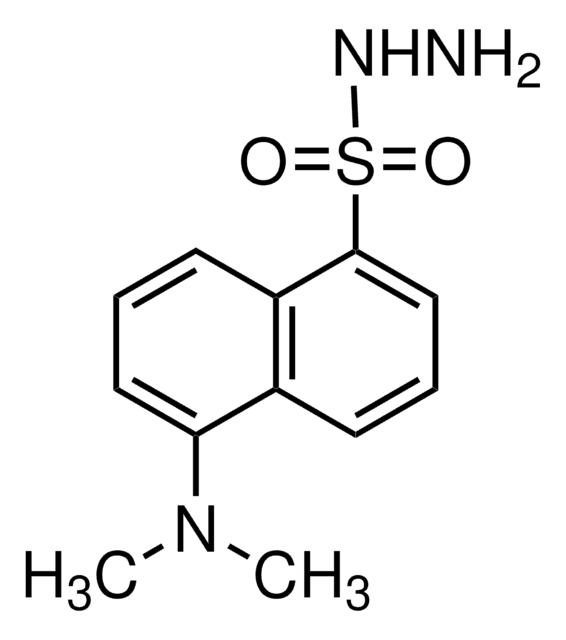MAK141
Fluorometric Aldehyde Assay Kit
sufficient for 200 fluorometric tests
Sign Into View Organizational & Contract Pricing
All Photos(2)
About This Item
Recommended Products
usage
sufficient for 200 fluorometric tests
application(s)
environmental
detection method
fluorometric
relevant disease(s)
neurological disorders
storage temp.
−20°C
General description
Aldehydes are highly reactive molecules, which play a role in many physiological, pathological and commercial processes. They have been implicated as environmental pollutants and in neurodegeneration and DNA damage. A method for rapid and accurate measurement of aldehydes is an important tool for biological and chemical research, the food industry and environmental pollution surveillance.
Aldehydes are highly reactive molecules, which play a role in many physiological, pathological and commercial processes. They have been implicated as environmental pollutants, and in neurodegeneration and DNA damage. A method for rapid and accurate measurement of aldehydes is an important tool for biological and chemical research, the food industry, and environmental pollution surveillance.
The Fluorometric Aldehyde Assay Kit provides a simple and direct procedure for measuring aldehydes in samples in which the pH is physiological and higher. Aldehyde reacts with a fluorogenic dye, resulting in a fluorometric (λex = 365/λem = 435 nm) product proportional to the amount of aldehydes present. The Fluorometric Aldehyde Assay Kit has a lower limit of detection of 0.3 nanomole of aldehyde in a 100 μL assay volume (3 μM).
The Fluorometric Aldehyde Assay Kit provides a simple and direct procedure for measuring aldehydes in samples in which the pH is physiological and higher. Aldehyde reacts with a fluorogenic dye, resulting in a fluorometric (λex = 365/λem = 435 nm) product proportional to the amount of aldehydes present. The Fluorometric Aldehyde Assay Kit has a lower limit of detection of 0.3 nanomole of aldehyde in a 100 μL assay volume (3 μM).
Suitability
This kit is suitable for the detection of aldehydes in a variety of samples, particularly when the samples are at a higher pH. When working with samples in a low pH, product number MAK140, Colorimetric Aldehyde Assay, is more suitable.
Principle
The fluorometric aldehyde assay kit provides a simple and direct procedure for measuring aldehydes in samples in which the pH is physiological and higher. Aldehyde reacts with a fluorogenic dye, resulting in a fluorometric (λex = 365/λem = 435 nm) product proportional to the amount of aldehydes present. The fluorometric aldehyde assay has a lower limit of detection of 0.3nanomole of aldehyde in a 100μL assay volume (3μM).
Signal Word
Warning
Hazard Statements
Precautionary Statements
Hazard Classifications
Met. Corr. 1
Storage Class Code
8A - Combustible corrosive hazardous materials
Flash Point(F)
Not applicable
Flash Point(C)
Not applicable
Certificates of Analysis (COA)
Search for Certificates of Analysis (COA) by entering the products Lot/Batch Number. Lot and Batch Numbers can be found on a product’s label following the words ‘Lot’ or ‘Batch’.
Already Own This Product?
Find documentation for the products that you have recently purchased in the Document Library.
The Role of Mitochondrial Aldehyde Dehydrogenase 2 (ALDH2) in Neuropathology and Neurodegeneration.
Chen C H, et al.
Acta Neurologica Taiwanica, 25(4), 111-123 (2016)
Lucas A J Ahrens et al.
PloS one, 12(4), e0175095-e0175095 (2017-04-06)
Controlled release drug delivery systems are well established as oral and implantable dosage forms. However, the controlled release paradigm can also be used to present complex soluble signals responsible for cellular organization during development. Endochondral ossification (EO), the developmental process
Xianzun Tao et al.
JCI insight, 7(13) (2022-07-09)
Polyamine dysregulation plays key roles in a broad range of human diseases from cancer to neurodegeneration. Snyder-Robinson syndrome (SRS) is the first known genetic disorder of the polyamine pathway, caused by X-linked recessive loss-of-function mutations in spermine synthase. In the
Our team of scientists has experience in all areas of research including Life Science, Material Science, Chemical Synthesis, Chromatography, Analytical and many others.
Contact Technical Service





